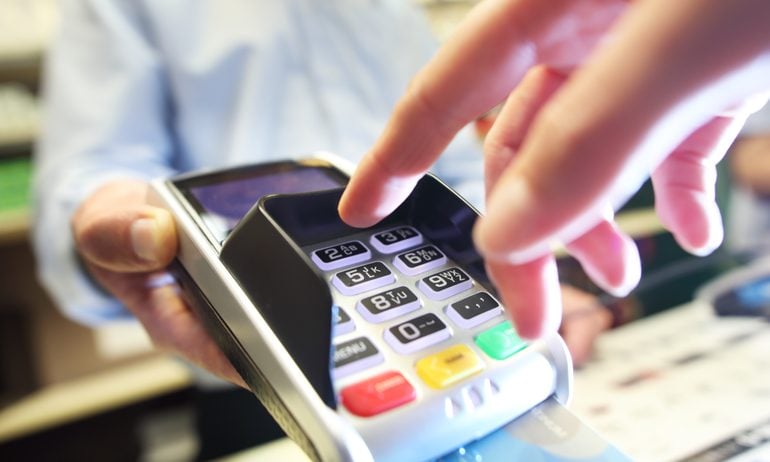Credit Card Surcharges, Convenience Fees and Processing Fees: Are They Legal?
Paying an extra fee to use (or accept) a credit card can be annoying, but in most cases, the charges are allowed and legit.

Many or all of the products on this page are from partners who compensate us when you click to or take an action on their website, but this does not influence our evaluations or ratings. Our opinions are our own.
Paying with a credit card can sometimes trigger various fees — for the customer and the business. For the most part, these fees are legal, though a handful of states have banned merchants from assessing some of them.
Here’s what you need to know about the fees you may encounter when paying with (or accepting) a credit card.
Surcharges
Surcharges are sometimes levied by merchants onto credit-card paying customers. Accepting credit cards as a payment method costs merchants money (more on that below), so some of those businesses may choose to tack on a surcharge — some percentage of the transaction — to offset some of those costs.
Say your local pizza place’s menu displays two prices: the cash price and the credit card price. That restaurant imposes a surcharge for paying with a credit card. It's also why you'll often see similar pricing language on gas station signage.
But merchants aren’t allowed to impose excessive surcharges in order to increase profits. Mastercard caps surcharges at 4% of the transaction, while Visa limits them to 3%. Furthermore, merchants must inform customers of the surcharge before the purchase is made and on the receipt. The language may differ from merchant to merchant, but some examples of wording you may see posted on a store's front door and/or your bill:
4% “non-cash service fee.”
3.99% “discount for all cash purchases.”
3.5% “will be deducted from checks paid in cash.”
“Non-cash adjustments are not greater than our cost of acceptance.”
A few states prohibit or limit surcharging, but the majority have no laws regarding the practice, according to Don Apgar, director of the merchant payments practice at Javelin Strategy & Research.
Surcharges aren’t allowed on purchases made with debit and prepaid cards.
Convenience fees
Another fee paid by the customer, a convenience fee may be assessed when you want to use a payment method that isn’t generally accepted by a merchant. For example, convenience fees are common when paying taxes with a credit card. The government allows you to pay with a credit card instead of cash, check or debit — but you’ll incur a convenience fee, precisely for the convenience of paying with the method of your choice.
Convenience fees, unlike surcharges, are a flat rate that is the same for all transactions.
Convenience fees are legal in all 50 states, but in December 2024, the Federal Trade Commission adopted a new rule that requires businesses to disclose all additional fees upfront rather than at checkout.
Processing fees
Processing fees are paid by the merchant in order to accept credit card payments. There are three types of processing fees, and they’re all legal: assessment, interchange and payment processing.
Assessment fees. This fee is paid to the payment network that handles the merchant’s transactions. The majority of credit cards run on one of four payment networks: American Express, Discover, Mastercard or Visa.
Interchange fees. Often referred to as swipe fees, interchange fees end up going to multiple parties, including the bank that issues the credit card. The credit card networks set interchange fees.
Payment processing fees. The merchant pays a fee to the payment processing company that handles the transactions.
A measure first introduced in Congress in 2022 — the Credit Card Competition Act — is intended by supporters to indirectly lower interchange fees by allowing merchants more choice in which payment network gets used to process credit card transactions. Opponents argue the measure might, among other things, kill credit card rewards, which are funded by the interchange fees merchants pay.
How can I avoid paying these fees?
Surcharges and convenience fees are incurred only when you pay with a credit card, and not all businesses charge them. Still, to avoid them entirely, carry alternative payment methods like cash or checks, or make sure you're using a credit card that earns enough in rewards to offset the cost of the surcharge or convenience fee.
Find the right credit card for you.
Whether you want to pay less interest or earn more rewards, the right card's out there. Just answer a few questions and we'll narrow the search for you.





